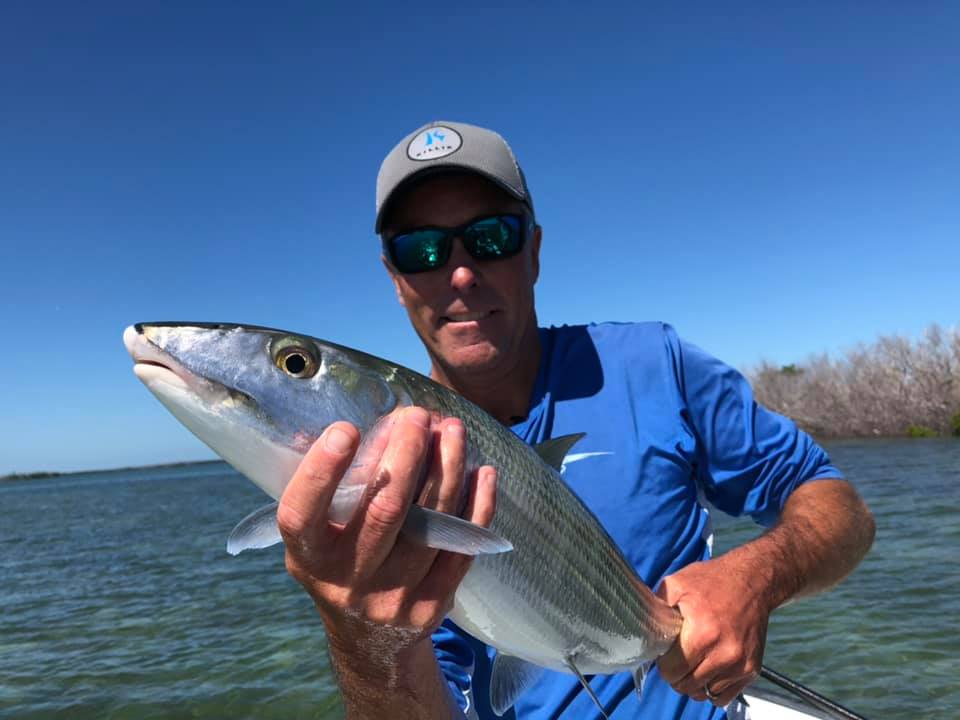Easy-to-Follow Advice From an Expert Fisherman
By Heather Madsen
Getting into the world of fishing can be intimidating at a glance. There are so many different types of fish, poles, styles, and lures, that the choices can seem overwhelming. Luckily there are people and resources out there to help you. One of those people is Chad LaChance, also known as the “Fishful Thinker.”
LaChance has been involved in the fishing world since he was just a kid. Some of his earliest memories are of fishing, and he used to spend his childhood summers catching fiddler crabs to use as bait to catch fish in Southern Florida. Being the only child of a single mother, he taught himself everything he knew, and now he teaches others. LaChance is currently a high school fishing coach and the founder of Fishful Thinker LLC, which provides guided trips, classes, and videos on all things fish. As LaChance put it, “I just never outgrew it.”
 LaChance has spent his life fishing and helping others discover that same passion and enjoyment, and he’s got quite a few accomplishments to show for it. So I interviewed him to get some insight into the world of fishing, and to see what kind of tips and advice he could give someone who is new to the sport.
LaChance has spent his life fishing and helping others discover that same passion and enjoyment, and he’s got quite a few accomplishments to show for it. So I interviewed him to get some insight into the world of fishing, and to see what kind of tips and advice he could give someone who is new to the sport.
One of the first things that’s useful for beginners to know is that there are so many different levels and types of fishing you can participate in. From the professional level all the way down to elementary school level competitions, there’s a place in the fishing world for everyone. LaChance currently coaches high school bass angling. He and Ryan Wood, his trainee, won the 2016 Bassmaster Classic high school exhibition tournament.
LaChance credits a large part of their success in that tournament to their loss the year before. In 2015 they came in last out of 275 participants. As devastating as that was, it gave them the motivation and learning opportunity to improve and come back the next year. As LaChance said, “There was nowhere to go but up. Worst case scenario we do as bad as last year.” So they got back to training but decided to throw the proverbial rule book out the window this time. One of the biggest pieces of advice LaChance offered me in our interview was, “Stick to your strengths,” and that’s exactly what they did. Instead of following what the book said and how other people successfully fished that lake, they focused on what they were good at and paid attention to the fish. This strategy ended up working for them and they came home the championship winners.
Book learning is important, and it can help you prepare, but you don’t get any experience from it. You have to be out on the water if you want to get better. “You can’t get caught up in what the books or the experts say.” That’s LaChance’s advice, as one of those aforementioned experts. Basically, no matter what level of angler you are, nothing beats hands-on experience and learning from your mistakes. LaChance summed up his philosophy by saying, “The reality is that fish have a tiny brain and great big mouth. You’re smarter than a fish. Just be observant and confident.” No two days are exactly the same, and sometimes your go-to lure won’t work. Have the confidence to make changes if they’re necessary.
Having that level of confidence as a beginner can be difficult because there are so many sources and “experts” out there. Everyone is going to try to teach you something different, but you don’t need to get all tangled up in that. Just remember, as LaChance would say, “You don’t need all that advice, and you don’t have to be good at every technique.” Try a few and see what works for you in your environment. If you ever get overwhelmed or your technique isn’t working, take a step back and go back to the basics. Don’t forget, “the food chain is pretty straightforward, and you’re definitely above the fish.” The fish don’t care about how flawless your technique is. They’re a simple animal and the best thing you can do is pay attention to how they behave and respond accordingly.
 Don’t feel like you have to buy a bunch of fancy equipment either. At the end of the day it isn’t about the product you use. LaChance suggests just getting a basic rod, reel, and line and getting yourself out onto the water: “Fishing is what you make of it. Don’t get lost in the tackle…. You’ll eventually evolve into whatever kind of angler you’re going to be.”
Don’t feel like you have to buy a bunch of fancy equipment either. At the end of the day it isn’t about the product you use. LaChance suggests just getting a basic rod, reel, and line and getting yourself out onto the water: “Fishing is what you make of it. Don’t get lost in the tackle…. You’ll eventually evolve into whatever kind of angler you’re going to be.”
Aside from mastering your mental game, LaChance also recommends being aware of your physicality. As a coach he requires all of his kids to stretch and drink water before they even get in the boat. It might not seem like an overly strenuous activity, but sitting in a boat for multiple hours requires core strength and burns more calories than you’d think. LaChance and the kids he coaches keep their stamina and energy up during competitions by avoiding candy, sugar, and any kind of carbonated drinks while in the boat. They also train on the water and do exercises that work core and arm muscles, like paddleboarding.
If you’re someone who is fishing from land, and maybe sitting in a chair with a beer in your hand, you’re going to get less of a workout. But that doesn’t mean that it’s any less worth it. Like LaChance told me, “I’d go crazy if I tried to judge all the people who don’t fish like me. If you’re having fun, who cares. Fishing is what you make of it.” So don’t worry if you’re not pulling in as many fish as your neighbor. The important thing is that you’re enjoying the experience.
If you’re interested in getting into the world of fishing, or if you’d just like to learn more, follow this link. You can also visit us online at Sportsmans.com, or at your local Sportsman’s Warehouse.

_small.jpg)